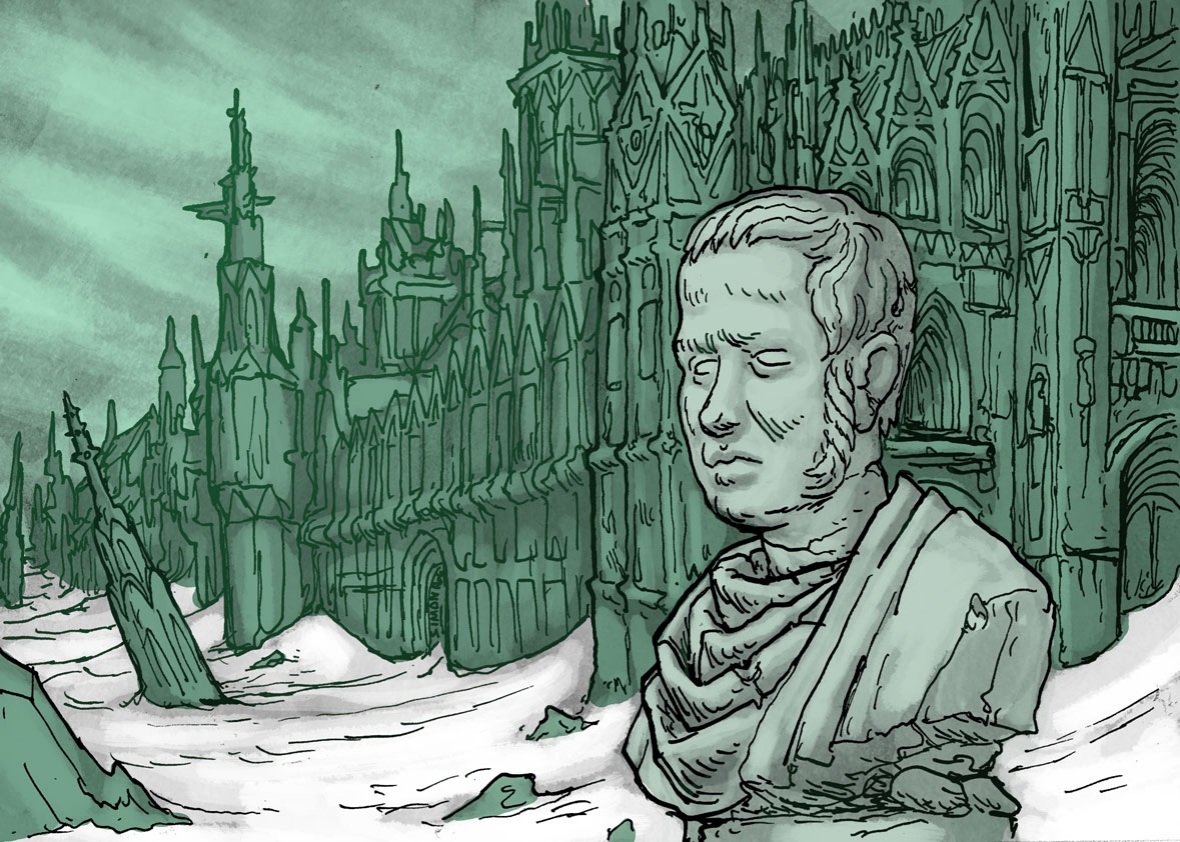
Slate is an Amazon affiliate and may receive a commission from purchases you make through our links.
The Romantics and the Opium-Eater
The long, wild, and squalid life of Thomas De Quincey.

Simon Roy
If you were a British teenager on fire with the love of art at the turn into the 19th century, there was only one thing to be: a Romantic. Thomas De Quincey was just such a teenager when he discovered William Wordsworth and Samuel Taylor Coleridge’s Lyrical Ballads, a salvo fired against the ornate, figurative, refined style that dominated English poetry. Its characters were humble people, children, and vagrants, and it ended with the long, weird, visionary tale of a sailor whose crime in shooting a lucky seabird condemns his shipmates and himself to roam cursed seas.
At 16, De Quincey, still high on the experience of reading Lyrical Ballads, speculated in his diary about the sort of man he’d shortly become. “What shall be my character?” he asked, “wild — impetuous — splendidly sublime? dignified — melancholy —gloomily sublime? or shrouded in mystery — supernatural — like the ‘ancient mariner’ —awfully sublime?” Sublimity, which to the Romantics meant a rough, awestriking type of beauty, was a given. De Quincey would go on to become one of the chief memoirists of an autobiography-mad age, and his most famous work, Confessions of an English Opium-Eater, would launch an entirely new branch of the genre, the addiction memoir. His lush, feverish prose style and Gothic preoccupations would make his work an inspiration and touchstone for writers ranging from Edgar Allan Poe and Charles Baudelaire to Jorge Luis Borges. But for the adolescent De Quincey in 1801, only one writer really mattered, and as Frances Wilson's vivid new biography, Guilty Thing, demonstrates, his obsession would be both the making and the breaking of his art.
So much has been written about the Romantics in the past 200 years that they can seem remote and dust-covered, the pet subjects of scholars whose work went out of fashion a century ago. But those lines from De Quincey’s diary punch through layers of dissertations and monographs to a reality anyone can related to: a dreamy adolescent contemplating possible identities the way you’d try on several pairs of sneakers. In the same diary, De Quincey wrote of icily shutting down the conversational forays of a couple of older gentlemen he’d once found good company; the dolts failed to appreciate the revolutionary importance of his idols. While he was sulking and fantasizing, De Quincey was also carefully crafting a fan letter to Wordsworth, the first stage in an ambitious plan to become the poet's friend, much as later generations of kids would turn up on Kurt Cobain’s doorstep.
Wilson, who wrote an award-winning biography of Dorothy Wordsworth (the poet’s sister), makes De Quincey a character so immediate you half expect him to materialize. The book would explode in a cloud of fluttering, perfumed pages, and the diminutive (he stood at 4 foot 11 inches) writer would step forth, shake your hand, and hit you up for a loan. Wordsworth, despite the rockiness of their relationship in years to come, maintained that everything De Quincey wrote was worth reading. (This meant a lot coming from the egotistical Wordsworth, although he might ultimately have revised that opinion in light of the tell-all “sketches” a hard-up De Quincey would later publish on the “daily life and habits” of the poet and his circle.) But Guilty Thing is short on literary analysis and long on dish; Wilson spends more words on De Quincey’s epic, late-life financial woes than on the Confessions themselves. (At one point, De Quincey’s indebtedness attained a level so fantastical that he had to go into hiding when he was sued by Holyrood Abbey, Edinburgh’s famed debtor’s sanctuary.) Her De Quincey is more literary character than literary figure.
So is her Wordsworth, and her account of the shifting relationship between De Quincey and his idol, who stood ramrod straight at the center of a circle of poets and writers who transformed English literature, is irresistible. During the first two decades of the 19th century, most of them, following Wordsworth, lived in or around the small rural town of Grasmere in England’s Lake District. To the true Romantic, this heady society became the subject of intense fascination. Every idealized literary scene that has followed it, from the Bloomsbury Group to the Beats, has been, consciously or unconsciously, modeled after it. As soon as the teenage De Quincey learned that his heroes had congregated in the Lake District, he resolved to go there and insinuate himself into their ranks. That’s where he was heading when he ran away from school in 1802, but he lost his nerve and headed to London instead, thinking he could live on borrowings against an eventual inheritance. He was wrong about that, and De Quincey spent the better part of a year living on the streets, befriending the young prostitute he describes so heartrendingly in Opium-Eater.
Or did he? The girl might never have existed. De Quincey, especially on the topic of himself, was the ultimate unreliable narrator. Even the title of Confessions is misleading. He didn’t eat opium; he drank it, in the form of laudanum. But eating it sounded so much more exotically transgressive—laudanum was widely prescribed to all sorts of prosaic Britons. De Quincey was a man prone to emotional extremes, from wracking dread to otherworldly ecstasy, and his device of choice was hyperbole; he once described his guilt over his opium binges as having “the weight of twenty Atlantics.” “Life for De Quincy,” Wilson writes, “was either angels ascending on vaults of cloud or vagrants shivering on the city streets. It was being earthbound that he found hardest to describe.”
Biographies tend to be about extraordinary people: It’s the rarity of their experiences and achievements that makes them interesting. Novels, on the other hand, work better when the central characters are closer to average, when we can see our own lot reflected in theirs. Memoirs fall somewhere in between, which is also where De Quincey dwells. Certainly, he was an influential writer, well-thought-of by his peers. But when De Quincey wormed his way into the life of William Wordsworth, he found himself surrounded by bona fide geniuses: not just Wordsworth himself and Coleridge, but also the great essayist William Hazlitt. In a scenario more than a little reminiscent of All About Eve, De Quincey made himself indispensable, playing secretary and sounding board, performing helpful tasks and playing with Wordsworth’s children. It was a situation almost guaranteed to lead an ambitious and self-absorbed man to disillusionment and resentment.

Johnathan Ring
De Quincey had also stepped into a domestic situation of near-quantum complexity. The Wordsworths—a peculiar triangular unit that included the poet, his wife, and his sister, to whom he was exceptionally close—considered Coleridge’s wife shallow. Throughout much of this period, Coleridge stayed with the Wordsworths while his wife and children lived in another house in the area. Then he fell madly in love with Wordsworth’s sister-in-law, an unruly passion that would eventually drive the poor woman to the brink of a nervous breakdown. Coleridge himself was an opium addict, which made him just about the worst houseguest of all time. He slept all day and woke up the household in the middle of the night, to the disgust of the sober Wordsworth. While De Quincey was still making himself agreeable in Grasmere, many in the circle, Wilson speculates, imagined that he might marry Dorothy Wordsworth. Instead he became infatuated with a poor, barely educated farmer’s daughter, got her pregnant, and did the right thing by marrying her. The Wordsworths, who prided themselves on their egalitarian views, were nevertheless shocked by the match and snubbed her, alienating De Quincey.
And so on and so on. Much of Guilty Thing resembles Sally Wainwright’s brilliant Yorkshire-set family drama Last Tango in Halifax, if, in between the intrigues and melodrama, all the characters went off into the corner for a bit to write towering masterpieces of English literature. De Quincey’s own daughter described him as an “extreme mixture of childish folly joined to a great intellect,” and while that formula doesn’t fit everyone milling around Grasmere in the 1810s, it nevertheless captures what makes accounts of the Lake Poets so habit-forming: the alternately amusing and appalling blend of Romantic grandeur and human folly.
Eventually, disenchanted, De Quincey decamped for London, Edinburgh, and other locales. Often he’d fill up his current quarters with books and papers to the degree that they became uninhabitable, then move someplace new. He was often severely broke, at one point writing to an editor to say that he was unable to leave the house to file a piece because he had sold all of his shoes. Wilson considers De Quincey to have been addicted not only to opium but to books and to the debt that financed both habits, but he was also, clearly, a hoarder.
To pay (sort of) for all of this, De Quincey worked as a journalist in one of the liveliest markets the profession has ever seen. Also, the deadliest. The recent feuding between BuzzFeed and the late, lamented Gawker pales in comparison to the 1820 rivalry between Blackwood’s Edinburgh Magazine and the upstart London Magazine. An editor of the former challenged the editor of the latter to a duel, a contretemps that left the London editor dead from a gut shot and a Blackwood’s staff writer crowing that his colleague was “wet with the blood of the Cockneys.” At one point, De Quincey, who committed the sin of writing for both magazines, feared that an editor of Blackwood’s, a former friend and Wordsworth acolyte, would kill him, too.
Wilson is refreshingly uninterested in explaining De Quincey’s character and behavior in light of contemporary understandings of addiction. This book is much more rewarding as a cautionary tale about the dangers of placing too much faith in art and as a jaundiced portrait of what it’s like to inhabit the fringes of greatness. In a late-life assessment of his years in Grasmere, De Quincey offered this sagacious advice: “Put not your trust in the intellectual princes of your age.” It is “safer to scrutinize the words of eminent poets than long to connect yourself with themselves.” The road to the sublime, alas, almost always features extensive travel through the realms of the ridiculous.
---
Guilty Thing: A Life of Thomas De Quincey by Frances Wilson. Farrar, Straus and Giroux.
Read the rest of the pieces in the Slate Book Review.
Guilty Thing: A Life of Thomas De Quincey
Check out this great listen on Audible.com. A dynamic biography of one of the most mysterious members of Wordsworth's circle and the last of the romantics. Thomas De Quincey - opium eater, celebrity journalist, and professional doppelgänger - is embedded in our culture. Modeling his character on ...
